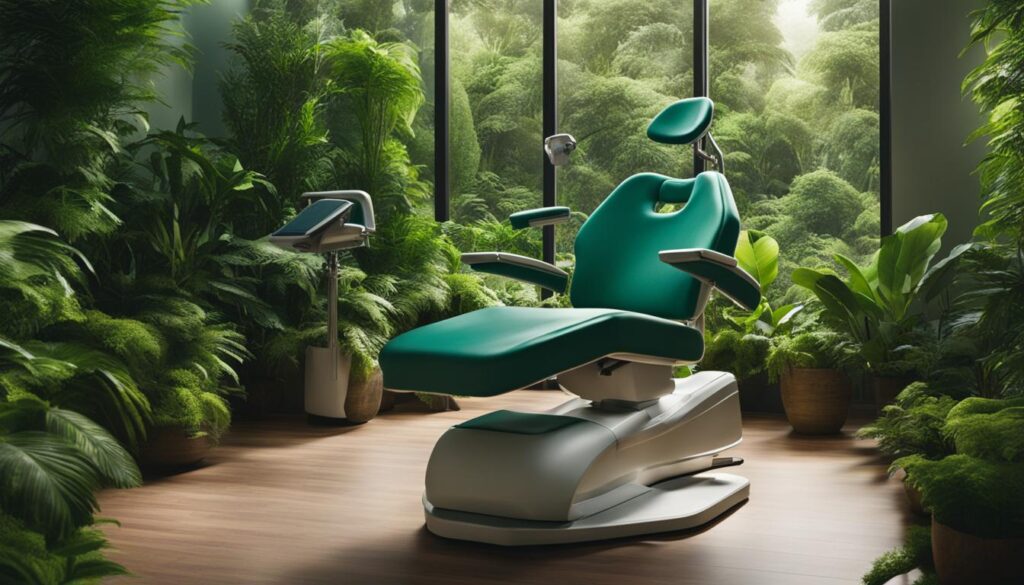We may earn money or products from the companies mentioned in this post.
As concerns over climate change and environmental degradation continue to grow, more and more industries are recognizing the importance of adopting sustainable practices. Dentistry is no exception. Dental procedures can have a significant impact on the environment, from the use of non-biodegradable materials to the energy consumption of dental offices. To address these issues, eco-friendly dental practices and green dentistry initiatives have emerged to promote environmental sustainability in dentistry.
Environmental sustainability in dentistry refers to the incorporation of eco-friendly practices and materials in dental care. This involves minimizing waste, reducing energy consumption, and using biodegradable or recyclable materials where possible. By adopting these practices, dental professionals can help to protect the environment while improving patient health outcomes.
Key Takeaways:
- Environmental sustainability in dentistry is crucial for protecting the planet and promoting patient health.
- Eco-friendly dental practices and green dentistry initiatives can help to minimize waste and reduce energy consumption.
- Using biodegradable and recyclable materials in dental care can have significant environmental benefits.
- Implementing sustainable practices in dental offices can lead to cost savings and a positive reputation among patients and the community.
- Educating and collaborating with other dental professionals is key to promoting environmental sustainability in the industry.
The Environmental Impact of Dental Procedures
Many dental procedures have a significant environmental impact, contributing to the pollution of waterways and the release of harmful greenhouse gases. Chemicals and waste products used in dental offices can also be hazardous to the health of dental professionals and patients.
To minimize the environmental impact of dental procedures, eco-conscious dental care is essential. This involves implementing sustainable practices that reduce waste and promote a more environmentally friendly approach to dentistry.
“The average dental practice produces 1.7 pounds of waste per patient per day.” – Eco-Dentistry Association
One of the most significant sources of waste in dental practices is single-use plastics, such as syringes, disposable cups, and packaging materials. These items contribute to the plastic pollution crisis and have a devastating impact on marine life and the environment.
To reduce the use of single-use plastics, dental professionals can switch to reusable alternatives, such as autoclavable metal syringes, glass cups, and biodegradable packaging materials. Additionally, recycling programs can be implemented to ensure that recyclable materials, such as paper and plastics, are properly disposed of and diverted from landfills.
| Common Dental Procedures | Environmental Impact |
|---|---|
| Amalgam Fillings | Release of mercury into the environment |
| X-rays | Release of harmful chemicals into the water supply |
| Disposable Materials | Contribution to the plastic pollution crisis |
In addition to reducing waste, eco-conscious dental care also involves minimizing energy consumption and water usage in dental offices. Energy-efficient appliances and lighting, as well as the use of renewable energy sources, can significantly reduce carbon emissions and energy bills. Additionally, implementing water-saving techniques, such as using low-flow faucets and toilets, can conserve water resources and reduce utility costs.
By implementing sustainable dental practices, dental professionals can significantly reduce their environmental impact and promote a more eco-friendly approach to oral health care.
Sustainable Dental Materials and Techniques
The use of sustainable dental materials and environmentally friendly dental practices is becoming increasingly important in today’s world. Dental professionals have a responsibility to promote sustainability by utilizing biodegradable and recyclable materials whenever possible.
One way to achieve this is by using composite resin fillings instead of traditional amalgam fillings. Composite resin fillings are made of a mixture of plastics and glass, making them more environmentally friendly than amalgam fillings, which contain mercury.
Biodegradable Dental Materials
Biodegradable dental materials are another option for promoting sustainability in dentistry. These materials break down naturally and do not harm the environment. Some examples of biodegradable materials used in dentistry include:
| Dental Material | Benefits |
|---|---|
| Bamboo toothbrushes | Biodegradable handle and packaging |
| Cornstarch-based dental floss | Biodegradable alternative to traditional nylon floss |
| Biodegradable impression trays | Eliminate waste from single-use plastic trays |
Recycling in Dentistry
Recycling is another important aspect of environmentally friendly dental practices. Dental offices can recycle items such as paper, cardboard, plastic, and glass. Old dental equipment can also be recycled or donated to organizations in need of medical supplies. By implementing recycling programs, dental practices can reduce their waste and carbon footprint.
Energy-Efficient Practices
Using energy-efficient practices is another way to promote sustainability in dentistry. Dental offices can switch to LED lighting, which uses less energy and lasts longer than traditional light bulbs. Automatic faucets and toilets can also help conserve water and reduce energy usage.
Implementing Green Dentistry in Practice
Implementing eco-conscious dental care practices is a critical step in promoting environmental sustainability in dentistry. Below are some practical tips on how to create a green dental office:
| Strategy | Description |
|---|---|
| Energy-efficient lighting and appliances | Switch to LED lighting and energy-efficient appliances to reduce energy consumption and costs. |
| Reduce paper waste | Use electronic patient records, digital imaging, and email communication to reduce paper consumption and waste. |
| Recycling program | Set up a comprehensive recycling program for paper, plastic, and other materials used in the office. |
| Water conservation | Install low-flow toilets and faucets to conserve water. |
| Use of eco-friendly dental products | Choose dental products made from natural and biodegradable materials such as bamboo toothbrushes, eco-friendly floss, and compostable cups and utensils in the break room. |
By implementing these strategies, dental offices can reduce their environmental impact and promote a healthier planet while still providing high-quality dental care to patients. In addition to these practices, dental professionals can actively educate their patients on the importance of eco-conscious dental care and encourage them to adopt sustainable practices themselves.
The Growing Demand for Eco-Friendly Dental Care
The global market for eco-friendly dental products and services is on the rise, driven by a growing demand for sustainable and environmentally conscious dental care. As consumers become more aware of the impact their actions have on the environment, they are seeking out dental practices that prioritize eco-friendly practices and offer sustainable solutions for oral health.
One of the main factors driving demand for eco-friendly dental products and services is the rise of the sustainable dental industry. Dental professionals are recognizing the importance of adopting environmentally conscious practices, both for the planet and for their patients’ health and well-being.
In addition, the use of eco-friendly dental products and sustainable techniques can lead to cost savings for dental practices. By reducing waste and energy consumption, dentists can minimize their environmental impact while also improving their bottom line.
The Market for Eco-Friendly Dental Products
The market for eco-friendly dental products is expanding rapidly, with new products and innovations emerging all the time. From bamboo toothbrushes to biodegradable floss, there are many options for individuals seeking sustainable alternatives to traditional dental products.
Many dental practices are also shifting towards eco-friendly products and services, offering patients a range of sustainable options for their oral care. This includes everything from digital X-rays to eco-friendly dental office supplies.
The Benefits of Sustainable Dental Industry
As the sustainable dental industry continues to grow, there are a number of benefits that will become more apparent. These include:
- Improved Environmental Impact: By adopting eco-friendly practices and materials, dental practices can reduce their carbon footprint and minimize waste.
- Positive Reputation: Practices that prioritize sustainability are viewed favorably by patients and the community, enhancing their reputation and opening up new business opportunities.
- Improved Patient Health Outcomes: Sustainable dental practices can lead to better patient health outcomes, as they minimize exposure to harmful chemicals and materials.
- Cost Savings: By adopting sustainable practices, dental practices can achieve cost savings through energy efficiency and waste reduction.
The Benefits of Environmental Sustainability in Dentistry
Dentistry is an essential healthcare service that has a significant impact on the environment. Adopting environmentally sustainable practices in the dental industry can bring about a range of benefits for patients, dental practitioners, and the planet.
Improved Patient Health Outcomes
By using eco-friendly dental products and materials, dental professionals can reduce the risk of harmful chemicals and pollutants being introduced into the mouths and bodies of patients. For example, using biodegradable and non-toxic dental materials can minimize the risk of allergic reactions and other adverse health effects in patients.
Cost Savings
Implementing sustainability measures in dental practices can help to reduce costs associated with waste disposal, energy usage, and water consumption. For example, using energy-efficient lighting and equipment can lower energy bills, while reducing water usage can lead to lower water bills. Additionally, practicing waste reduction strategies such as recycling can help to reduce landfill fees.
Positive Reputation
By promoting environmentally sustainable practices, dental practices can build a positive reputation within their communities. Patients are becoming increasingly conscious of the impact of healthcare on the environment, and are more likely to choose a dental practice that shares their values. Additionally, implementing sustainability measures can attract environmentally conscious staff, further enhancing the reputation of the practice.
Driving the Sustainable Dental Industry
Adopting environmentally sustainable practices in dentistry can support the growth of the sustainable dental industry. As demands for eco-friendly dental products and services increase, more businesses are exploring sustainable practices to meet these needs. Dental practices that prioritize sustainability can play a crucial role in driving this growth while contributing to a more sustainable future for the planet.
Overcoming Challenges in Eco-Friendly Dentistry
Transitioning to eco-friendly practices in dentistry is not without its challenges. From sourcing sustainable materials to implementing energy-efficient equipment, there are several obstacles that dental professionals must overcome to create a green dental office. In this section, we will explore some of these challenges and offer solutions to help make the sustainable dental industry a reality.
The Cost of Eco-Friendly Dental Products
One of the main challenges facing dental professionals when adopting eco-friendly practices is the cost of sustainable dental products. While the price of eco-friendly dental products may be higher than their traditional counterparts, the benefits they offer to both the environment and patient health make them a worthwhile investment. To overcome this challenge, dental professionals can consider purchasing these products in bulk to reduce costs and seek out suppliers that offer discounts for sustainable products.
Lack of Education and Training
Another challenge in promoting sustainable dental practices is the lack of education and training available to dental professionals. Many dentists and dental hygienists may not be aware of the environmental impact of traditional dental procedures and the benefits of eco-friendly alternatives. To address this issue, dental schools and continuing education programs can include sustainability training for dental professionals. Additionally, industry organizations can provide resources and support for dental practices seeking to make the switch to eco-conscious dental care.
Resistance to Change
Resistance to change is a common obstacle encountered when implementing eco-friendly practices in any industry, including dentistry. Some dental professionals may be hesitant to make the switch to sustainable dental materials and techniques due to comfort with traditional methods or concerns about the effectiveness of green alternatives. Overcoming this challenge requires a shift in mindset and a willingness to embrace innovative approaches to dental care. Dental professionals can start by researching and experimenting with sustainable dental products and techniques in small steps, gradually building up their use of eco-friendly solutions.
Collaboration and Community Support
Creating a sustainable dental industry also requires community support and collaboration between dental practices. Dental professionals can share their knowledge and best practices with each other, working together to reduce their carbon footprint and promote the use of eco-friendly dental products. Industry organizations can provide networking and educational opportunities for dental practices to connect and learn from each other. By working together towards a common goal, dental professionals can overcome the challenges of eco-friendly dentistry and make a positive impact on the environment.
Conclusion
Environmental sustainability in dentistry is crucial to the health of our planet and the well-being of future generations. Adopting eco-friendly practices and using sustainable materials can go a long way in reducing the carbon footprint of dental practices, minimizing waste, and promoting a cleaner and healthier environment.
The Role of Dental Professionals
Dental professionals play a significant role in promoting environmental sustainability in their practice. By implementing green dentistry initiatives, they can reduce the amount of waste produced during dental procedures, conserve energy, and promote the use of eco-friendly dental products. Moreover, adopting eco-friendly practices can lead to lower overhead costs, giving practices a competitive edge in an increasingly eco-conscious market.
The Benefits of Eco-Friendly Dentistry
There are many benefits to adopting eco-friendly dentistry. Studies have shown that using sustainable dental materials and implementing energy-efficient practices can lead to improved patient health outcomes, reduced waste, and cost savings. Additionally, promoting green dentistry can help practices build a positive reputation among patients and the community and contribute to the growth of the sustainable dental industry.
Overcoming Challenges
Transitioning to eco-friendly dentistry can be challenging. However, through education and collaboration, dental professionals can overcome obstacles and successfully implement sustainability practices in their practice. Continuing education courses and training programs can provide dental professionals with the knowledge and skills needed to incorporate eco-friendly practices into their daily routines.
Join the eco-friendly dentistry movement today and make a positive impact on the health of our planet and the well-being of future generations!
FAQ
What is environmental sustainability in dentistry?
Environmental sustainability in dentistry refers to the practice of implementing eco-friendly and green dentistry initiatives to minimize the environmental impact of dental practices. It involves adopting sustainable materials, energy-efficient practices, and waste reduction strategies.
What is the environmental impact of dental procedures?
Dental procedures can have a significant environmental impact due to the generation of waste, excessive water and energy consumption, and the use of non-biodegradable materials. It is important for dental practices to prioritize eco-conscious dental care to mitigate these impacts.
What are sustainable dental materials?
Sustainable dental materials are biodegradable or recyclable substances that are used in dental procedures. These materials are environmentally friendly and help reduce the carbon footprint of dental practices. Examples include biocompatible resins, bamboo toothbrushes, and plant-based packaging.
How can green dentistry be implemented in practice?
Green dentistry can be implemented in practice by adopting energy-efficient practices such as using LED lighting and energy-saving appliances, implementing digital record-keeping systems, practicing proper waste management and recycling, and using eco-friendly dental products.
What is the demand for eco-friendly dental care?
There is a growing demand for eco-friendly dental care as patients become more conscious of their environmental impact. This demand has led to the emergence of a sustainable dental industry, offering eco-friendly dental products and services to meet the needs of environmentally conscious patients.
What are the benefits of environmental sustainability in dentistry?
Environmental sustainability in dentistry offers several benefits, including improved patient health outcomes through the use of biocompatible materials, cost savings through energy-efficient practices, and a positive reputation among patients and the community for being environmentally responsible.
What challenges are faced in eco-friendly dentistry?
Dental professionals face challenges in transitioning to eco-friendly dentistry, including a lack of awareness about sustainable practices, limited availability of eco-friendly dental products, and the need for educational resources and collaboration within the dental industry. Overcoming these challenges requires a collective effort.
Affiliate Disclosure: This post may contain affiliate links. If you purchase through our link, we may receive a small commission, but at no additional cost to you. For more information, please see our Disclosure statement.



